 Petzlover
Petzlover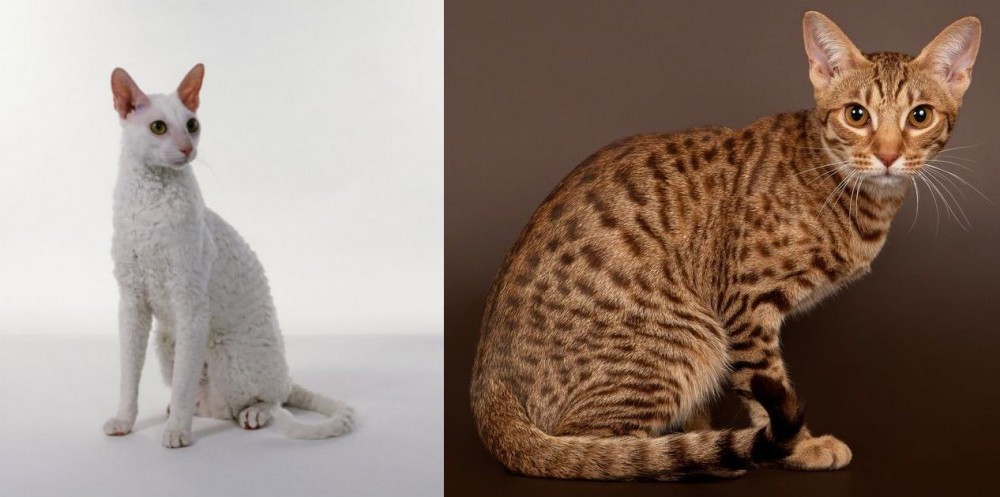 Cornish Rex is originated from United Kingdom but Ocicat is originated from United States. Both Cornish Rex and Ocicat are having almost same weight. Cornish Rex may live 3 years more than Ocicat. Both Cornish Rex and Ocicat has same litter size. Both Cornish Rex and Ocicat requires Low Maintenance.
Cornish Rex is originated from United Kingdom but Ocicat is originated from United States. Both Cornish Rex and Ocicat are having almost same weight. Cornish Rex may live 3 years more than Ocicat. Both Cornish Rex and Ocicat has same litter size. Both Cornish Rex and Ocicat requires Low Maintenance.
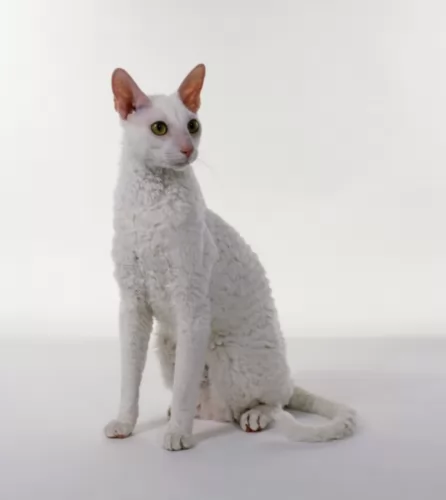 Cornwall is the birthplace of the unusual Cornish Rex cat – a curly-coated cat.
Cornwall is the birthplace of the unusual Cornish Rex cat – a curly-coated cat.
A kitten was born in 1950 and belonged to Nina Ennismore and Winifred Macalister. The other kittens had short hair but this unusual kitten had curly hair, the result of a spontaneous natural mutation.
A successful breeding program was started and it was in 1963 that the American Cat Fanciers Association as well as the and today it is recognized by all cat registries.
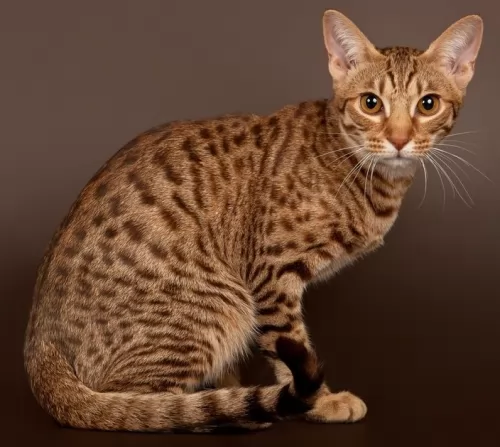 Virginia Daly was the first breeder of Ocicats, hailing from Michigan. She wanted to breed an Abyssinian-pointed Siamese in 1964 and the first kittens looked to be Abyssinian.
Virginia Daly was the first breeder of Ocicats, hailing from Michigan. She wanted to breed an Abyssinian-pointed Siamese in 1964 and the first kittens looked to be Abyssinian.
With the next litter, the Abyssinian-pointed Siamese and a spotted kitten, nicknamed an Ocicat. Further breedings produced more spotted kittens and became the basis of the Ocicat.
A breeding program was started for Siamese to Abyssinian, and the kittens bred to Siamese. Later the American Shorthair was introduced to the Ocicat and this brought in bigger boning as well as adding silver to the 6 colors of the Ocicat.
It was during the 1980s that the cat was accepted for registration in The Cat Fanciers' Association.
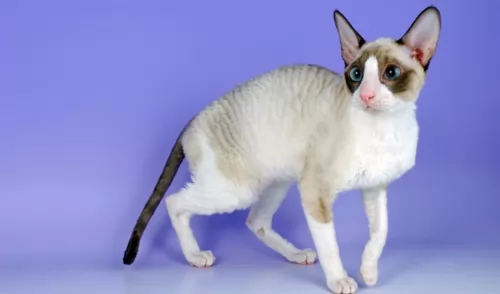 The Cornish Rex is a small to medium-sized cat weighing between 3 to 5kg. It’s a lithe, slender cat with a small, narrow head with big ears and eyes.
The Cornish Rex is a small to medium-sized cat weighing between 3 to 5kg. It’s a lithe, slender cat with a small, narrow head with big ears and eyes.
The cat has long, slender legs with a tail that is also slender and long. The hair is very fine and they are actually prone to hair loss. The coat has fine, short, silky hair. There can be a bit of a curl in the hair, The coat comes in many colors from white, silver, black, red, blue to chocolate and they can have different patterns too as well as bein bi-color.
The eyes can be gold, brown, or green. The torso is long and lean, the cat has a deep chest but strong hips and rear end that allow the Cornish Rex to leap with ease up onto perches.
The Cornish Rex loves his human family and loves spending time with them, whether that means fun and games or sitting in your lap.
He is intelligent and can learn a few tricks and is capable of learning to walk on a leash. He is a confident cat, playful and entertaining. Gentle and loving, he is a talkative cat, wanting to express his opinion about everything.
He will fit easily into different lifestyles, whether you’re single, a family, or in a retirement home, so long as he is receiving lots of attention.
He isn’t as frail as he looks and can get pretty active and social with children and dogs and may even beat the dog to fetching a small ball.
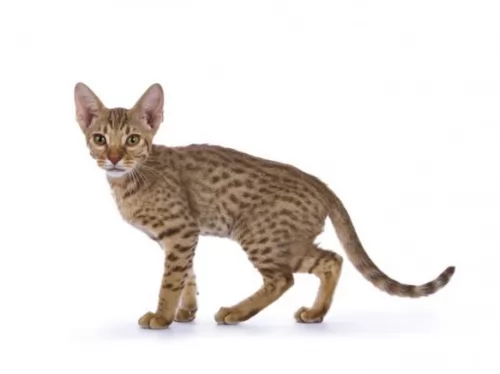 Ocicats, with their wedge-shaped heads, are strong, large cats with muscular legs that have striped markings. The cat can weight between 4 and 7kg. The ears are large and pointed.
Ocicats, with their wedge-shaped heads, are strong, large cats with muscular legs that have striped markings. The cat can weight between 4 and 7kg. The ears are large and pointed.
The cat has almond-shaped eyes. The fur has dark spots and there are many color variants that are approved by the major cat registries. The standard colors for the cat are chocolate, cinnamon and tawny.
These large cats have got personality traits from both cats – the Siamese and the Abyssinian. They are friendly, playful, and sociable cats, making excellent family pets, getting on well with children and other pets. Those who have owned them say owning such a cat is similar to owning a dog as they can be taught basic commands and tricks and even walk on a leash.
They are even known to swim with you. They’re cats that crave the attention of their human owners, but bond specifically with one person. It won’t do at all well in a household where it is left alone for long periods of time.
It's an intelligent cat and will most certainly need toys and a lifestyle that is stimulating.
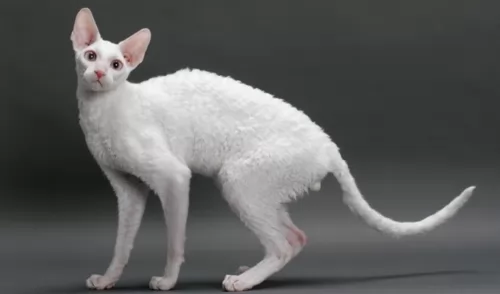 If you’re looking for a cat that can bring laughter and fun into the household, you won’t go wrong with a Cornish Rex as they will amuse and delight.
If you’re looking for a cat that can bring laughter and fun into the household, you won’t go wrong with a Cornish Rex as they will amuse and delight.
He is also a cat that doesn’t require a lot of fuss and bother, although he makes a fuss about the amount of attention he gets.
He doesn’t like being left alone for long, so a good idea is to work from home or to get a companion for him. Other than than, he makes the most splendid feline companion.
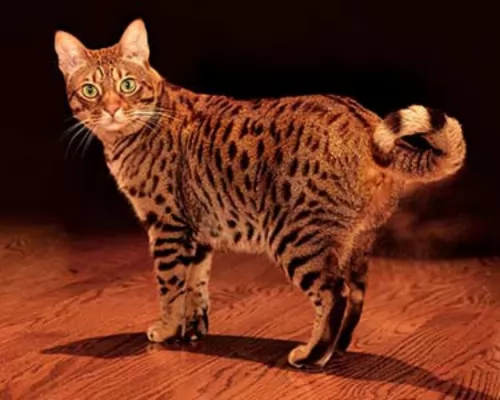 The Ocicat is a friendly, non-aggressive cat that is devoted to his human family. It’s a cat that thrives on being around people and won’t relish being left alone for long periods of time.
The Ocicat is a friendly, non-aggressive cat that is devoted to his human family. It’s a cat that thrives on being around people and won’t relish being left alone for long periods of time.
The largish cat is intelligent and easily trainable. He loves toys and it will be good to buy him some toys that require him thinking a little bit.
Highly energetic, he’ll love nothing more than for you to become involved in his games. Give him the attention he craves and he’ll become your best friend.
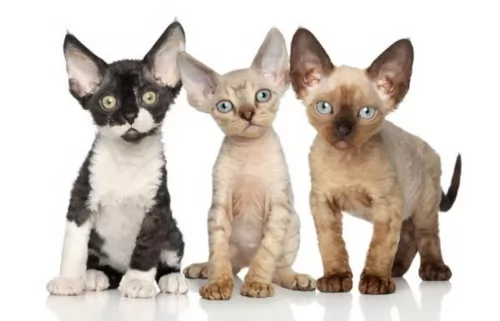 The Cornish Rex is a hardy cat with very few health issues. Certainly, because of the very fine hair, you’d have to be aware of sunburn.
The Cornish Rex is a hardy cat with very few health issues. Certainly, because of the very fine hair, you’d have to be aware of sunburn.
Cats can get sunburned and can be at serious risk of getting skin cancer later on. Be sun-smart and apply pet sunscreen.
Be careful of the type of sunscreen you use as your cat will likely want to lick it off. Other issues to look out for are hypertrophic cardiomyopathy. This is a common kind of heart disease in cats where there is a thickening in the wall of the heart.
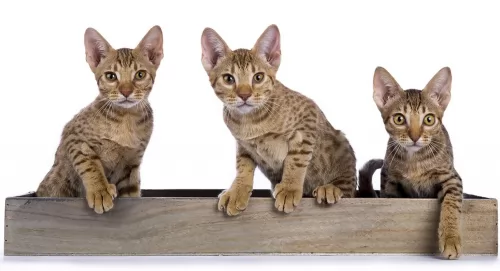 Diet is a crucial part of being a healthy cat, There are many excellent commercially manufactured cat foods on the market and your cat might prefer the wet- or dry type of cat food.
Diet is a crucial part of being a healthy cat, There are many excellent commercially manufactured cat foods on the market and your cat might prefer the wet- or dry type of cat food.
The idea is to choose the highest quality cat food that is packed with meat and protein as your cat is a carnivore. One good way to choose a good cat food is to read the ingredients and make sure that the first ingredients are meat.
He wants chicken, tuna, liver and pheasant in his diet. Make sure that the food also contains taurine as this is an essential amino acid that every cat must have.
If in any doubt, speak to your vet as cats require certain vitamins and minerals to remain healthy. Always ensure a fresh supply of cool drinking water.
Your cat requires being vaccinated and dewormed.
Get to know a good vet in your area so that if your cat is sick, you don't have to waste precious time searching for a vet.
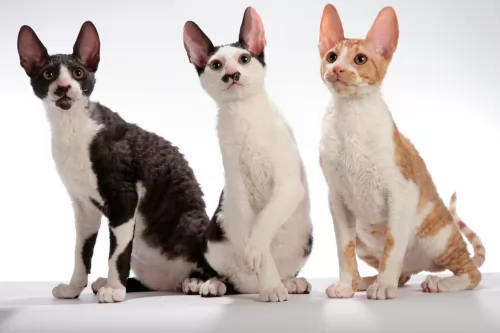 Grooming your Cornish Rex isn’t going to be an issue as the cat has very little hair. Although nothing is set in stone and some Cornish Rex’s have thicker coats, requiring more brushing. Maybe a soft brush once a week will be sufficient for this cat breed.
Grooming your Cornish Rex isn’t going to be an issue as the cat has very little hair. Although nothing is set in stone and some Cornish Rex’s have thicker coats, requiring more brushing. Maybe a soft brush once a week will be sufficient for this cat breed.
A good idea is to take a cloth of warm water and to gently wipe your cat so that he is free of dust.
Supply a litter box and make sure that you remove his droppings every single day.
Have your pet neutered or spayed if you don’t want unwanted kittens. These minor ops have many health benefits for your cat as well.
When you brush your cat, check his entire body out for any abnormalities. Check for new lumps, check inside the ears to make sure they are clean and free of redness which could indicate an infection.
Clip his toenails, make sure his eyes are clear and bright, free of discharge, and check inside his mouth to make sure there aren’t any bad teeth, as this could cause him a lot of discomfort.
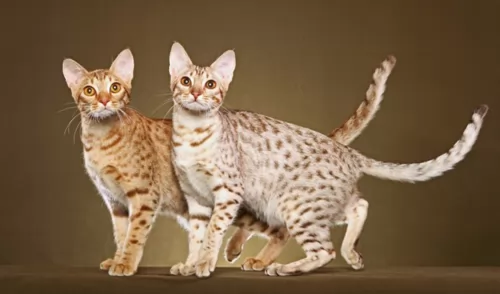 Provide your Ocicat with companionship as these are cats that can’t be left for hours on their own.
Provide your Ocicat with companionship as these are cats that can’t be left for hours on their own.
Provide your Ocicat with a litterbox that is kept clean. Your ocicat’s dropping must be regularly raked up out of the litter box sand and removed. A cat won’t use a dirty litterbox.
Treat your Ocicat for parasites. In fact, treating parasites isn’t a once-off treatment but ongoing. You can consult with your veterinarian for advice on the best and safest way to treat your pet for worms, ticks, fleas, and mites.
Brush your Ocicat’s fur once a week. They have short fur so they are fairly low maintenance. You can use a rubber hand brush and you can even wipe the fur down with a damp cloth to remove dust. He will have to have his claws trimmed.
Nobody should buy a pet and then do as little as possible for it. Your Ocicat’s going to need daily exercise as well as mental stimulation and he will require this through interaction with his human family. Buy him stimulating toys to keep him busy, play games with him and buy a cat leash so you can take him on walks outdoors for a bit of sunlight.